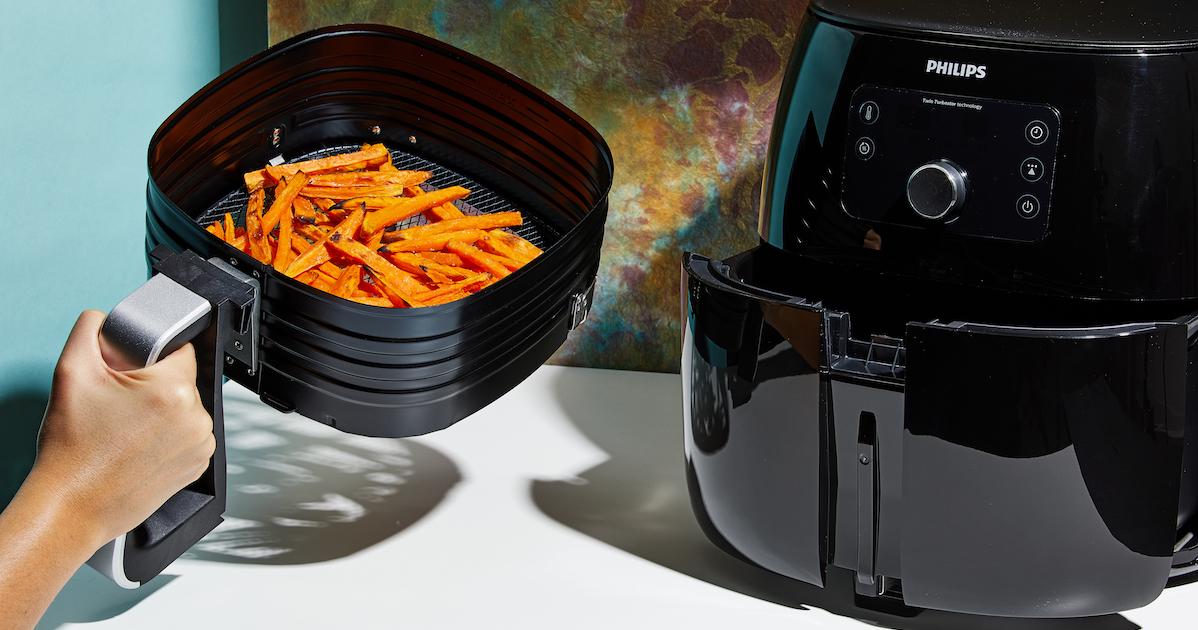TikToker Claims Air Fryers May Pose Health Risk After Testing for Lead – Should Parents Be Worried?
"I have a glass airfryer. I love it."
Published July 8 2024, 5:00 a.m. ET

Air fryers have been all the rage for several years now, but does this convenience come at a price? TikToker and mother Caylan (@caylanbouska) recently posted a video with 3.5 million views about a potential health hazard linked to her Ninja air fryer.
In the first-person video, Caylan captures her air fryer with text overlaying it, "Use this every day guys!!! For his lunch!" She then explains, "So I seen a video on Facebook of this mom saying like her kid had heavy metals in him such as my son Colt. He went to the doctor and he had heavy lead in him. Well, she couldn't figure out where it was coming from and I couldn't either but I thought it was coming from my water but no it's coming from this air fryer right here. Positive for lead. How freaking crazy?"

Air fryers are kitchen appliances that use convection to circulate hot air around the food, producing a crispy layer similar to frying but without the need for suspending the food in oil. Introduced in 2010 by Philips, air fryers quickly gained popularity for their ability to make healthier versions of traditionally deep-fried foods.
Their history traces back to the trend of health-conscious cooking and the desire for convenience in meal prep. Since their introduction to the market, air fryers have seen a consistent increase in sales year over year, driven by the growing demand for quick, easy, and healthy cooking options.
Many users were shocked to hear about the potential hazard but also expressed frustration over the constant barrage of health warnings. One user wrote, "It's something every day! It was the dishwasher pods yesterday."

Another parent commented similarly, "Y'all when I say I’m so overwhelmed trying to avoid being poisoned by literally everything" A third user, however, debunked the claim, "I have the same air fryer, just tested mine and it came out negative." Another provided an alternative, "I have a glass air fryer. I love it."
Parents' concerns over their kids' choices have been on the rise recently, especially with platforms like TikTok where anyone can go viral with their latest reveals. Fears about children consuming toxic or potentially poisonous foods have intensified, particularly with the rising popularity of new kitchen appliances like air fryers.

Concerns have emerged about whether these devices might release harmful chemicals or toxins into the food. Microwaves, similarly, had a moment like this when they gained popularity in the 1970s.
While most modern air fryers are designed with non-toxic materials such as BPA/PFOA-free Teflon, stainless steel, or ceramic coatings, there are still risks if these coatings become damaged or if the devices are not properly cleaned and maintained.
Experts advise using air fryers with intact non-stick coatings and adhering to cleaning guidelines to prevent the release of any potentially harmful compounds.

Despite some isolated incidents and general fear, research generally supports that air fryers are safe to use when handled correctly. However, the anxiety among parents is a very real thing, driven by a broader worry about environmental toxins and food safety.
Caylan's PSA to parents serves as a reminder to stay vigilant and involved. As with any kitchen appliance, proper maintenance and regular checks are key to ensuring safety.
It also isn't the first time the positive-vibes tide (at least for some) has turned for a popular product everybody and their daughter want to have — there have been a number of posts from folks warning others about levels of lead found in popular Stanley tumbler cups.
The BBC reported that yes, the company has indeed confirmed there is lead in the tumblers that they produce, but as many outlets and experts have stated, the lead that is used in the manufacturing processes of Stanley cups is done in such a way that accessing or ingesting this lead isn't likely.

In the ever-evolving landscape of health and safety concerns, Caylan's story calls to light the importance of being proactive and informed about the products we all use daily. As the old adage goes, “it’s better to be safe than sorry.”